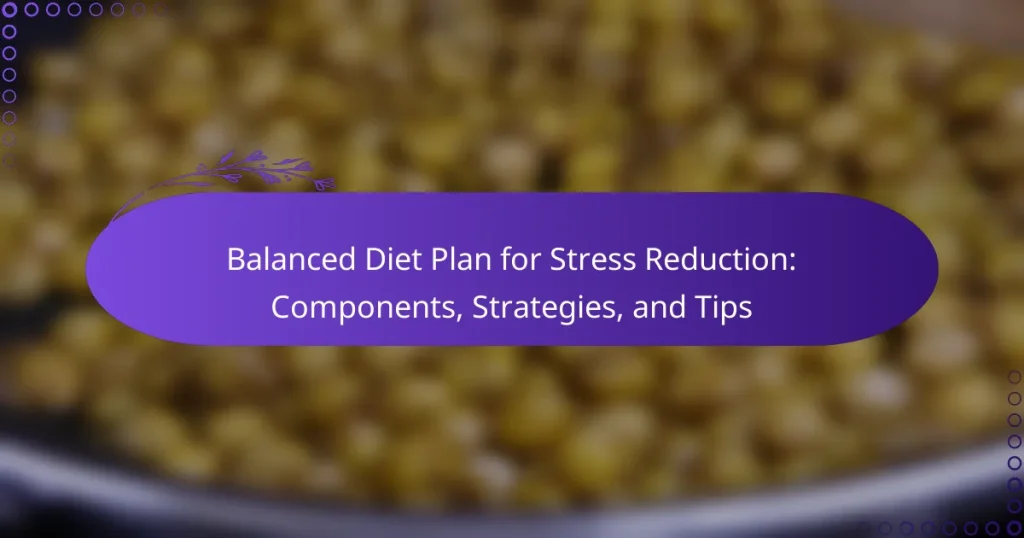Nutrition plays a vital role in managing stress by influencing mood and mental health. By incorporating foods rich in omega-3 fatty acids, magnesium, and antioxidants, individuals can enhance their ability to cope with stress. Conversely, avoiding high-sugar snacks and processed foods can help stabilize mood and reduce anxiety levels.
Hydration’s Role in Managing Stress: Daily Intake, Benefits, and Tips
Meal Prep for Stress Management: Strategies, Tools, and Techniques
Balanced Diet Plan for Stress Reduction: Components, Strategies, and Tips
Sugar’s Impact on Stress Levels: Effects, Sources, and Alternatives
Sugar’s Impact on Stress Levels: Effects, Sources, and Alternatives
Sugar’s Impact on Stress Levels: Effects, Sources, and Alternatives
Sugar’s Impact on Stress Levels: Effects, Sources, and Alternatives
Sugar’s Impact on Stress Levels: Effects, Sources, and Alternatives
Sugar’s Impact on Stress Levels: Effects, Sources, and Alternatives
What are effective nutrition strategies for stress management?
Effective nutrition strategies for stress management focus on incorporating specific nutrients that help regulate mood and reduce anxiety. By prioritizing foods rich in omega-3 fatty acids, magnesium, whole grains, antioxidants, and maintaining proper hydration, individuals can better manage stress levels.
Incorporating omega-3 fatty acids
Omega-3 fatty acids are essential fats that play a crucial role in brain health and mood regulation. Foods such as fatty fish (like salmon and mackerel), walnuts, and flaxseeds are excellent sources. Aim for at least two servings of fatty fish per week to reap the benefits.
Consider supplementing with fish oil if dietary sources are insufficient, but consult a healthcare provider for appropriate dosages. Regular intake can help lower stress and improve overall mental well-being.
Utilizing magnesium-rich foods
Magnesium is a mineral that helps regulate stress hormones and supports nervous system function. Foods high in magnesium include leafy greens, nuts, seeds, and whole grains. Incorporating these foods into daily meals can help maintain adequate magnesium levels.
Adults should aim for around 310-420 mg of magnesium daily, depending on age and gender. A magnesium-rich snack, like a handful of almonds, can be a simple way to boost intake and combat stress.
Emphasizing whole grains
Whole grains provide complex carbohydrates that stabilize blood sugar levels and promote serotonin production, which can enhance mood. Foods such as brown rice, quinoa, and whole grain bread are beneficial choices. Aim to fill half your plate with whole grains at meals.
Switching from refined grains to whole grains can lead to better energy levels and reduced stress. Look for products labeled “100% whole grain” to ensure you are getting the full benefits.
Increasing antioxidant intake
Antioxidants help combat oxidative stress in the body, which can be heightened during stressful periods. Fruits and vegetables, particularly berries, citrus fruits, and dark leafy greens, are rich in antioxidants. Aim for a variety of colors on your plate to maximize nutrient intake.
Incorporating a daily serving of berries or a colorful salad can significantly boost your antioxidant levels, aiding in stress reduction and overall health.
Hydration and its impact
Staying hydrated is essential for optimal brain function and mood stability. Dehydration can lead to increased feelings of anxiety and fatigue. Aim for at least 2 liters of water daily, adjusting based on activity level and climate.
Incorporate hydrating foods like cucumbers, oranges, and soups into your diet. Keeping a water bottle handy can serve as a reminder to drink throughout the day, helping to manage stress effectively.
How does diet affect stress levels?
Diet significantly impacts stress levels by influencing hormonal balance, energy levels, and overall mental health. Consuming a balanced diet rich in nutrients can help stabilize mood and reduce anxiety, while poor dietary choices may exacerbate stress and lead to negative health outcomes.
Connection between blood sugar and stress
Blood sugar levels play a crucial role in stress management. Fluctuations in blood glucose can lead to irritability and anxiety, making it essential to maintain stable levels through regular, balanced meals. Aim for a diet that includes complex carbohydrates, healthy fats, and protein to avoid spikes and crashes.
Incorporating foods like whole grains, nuts, and legumes can help regulate blood sugar. Avoiding excessive sugar and refined carbs is also important, as these can cause rapid increases in blood sugar followed by sharp declines, which may trigger stress responses.
Role of gut health in stress response
Gut health is closely linked to stress response due to the gut-brain axis, which connects the digestive system and the brain. A healthy gut microbiome can produce neurotransmitters that regulate mood, while an imbalanced gut can lead to increased anxiety and stress. Probiotics and prebiotics found in fermented foods and fiber-rich fruits and vegetables can support gut health.
To promote gut health, consider incorporating yogurt, kefir, sauerkraut, and high-fiber foods into your diet. Reducing processed foods and sugars can also help maintain a balanced gut microbiome, ultimately aiding in stress management.
What foods should be avoided for stress management?
To effectively manage stress, it is crucial to avoid certain foods that can exacerbate anxiety and tension. High-sugar snacks, caffeine, and processed foods can negatively impact mood and overall mental health.
High-sugar snacks and their effects
High-sugar snacks can lead to rapid spikes and drops in blood sugar levels, which may increase feelings of anxiety and irritability. When consumed, these snacks can provide a quick energy boost, but the subsequent crash often results in fatigue and mood swings.
To minimize stress, consider limiting sugary treats like candies, pastries, and sugary beverages. Opt for healthier alternatives such as fruits or nuts that provide sustained energy without the sugar crash.
Caffeine and anxiety correlation
Caffeine is a stimulant that can heighten feelings of anxiety and stress. Consuming high amounts of caffeine from coffee, energy drinks, or sodas can lead to increased heart rate and nervousness, making it more difficult to manage stress effectively.
To reduce anxiety, try limiting caffeine intake to one or two cups of coffee per day, or consider switching to herbal teas that are naturally caffeine-free. Monitoring your body’s response to caffeine can help you find the right balance.
Processed foods and inflammation
Processed foods often contain unhealthy fats, sugars, and additives that can promote inflammation in the body. Chronic inflammation has been linked to increased stress levels and mental health issues, making it essential to limit these foods in your diet.
Focus on whole, unprocessed foods such as fruits, vegetables, whole grains, and lean proteins. These options not only support overall health but can also help reduce inflammation and improve mood.
How can meal planning reduce stress?
Meal planning can significantly reduce stress by providing structure and predictability in your daily routine. By organizing meals in advance, you can minimize last-minute decisions and the anxiety that often accompanies them.
Benefits of structured meal times
Structured meal times create a sense of routine, which can be comforting during stressful periods. Regular eating schedules help regulate your body’s internal clock, leading to better digestion and energy levels.
Establishing specific times for meals can also enhance mindfulness, allowing you to focus on your food and enjoy the eating experience. This practice can prevent overeating and promote healthier choices.
Batch cooking for convenience
Batch cooking involves preparing large quantities of food at once, which can save time and reduce daily stress. By cooking multiple meals in one session, you can ensure you have nutritious options readily available throughout the week.
Consider dedicating a few hours on the weekend to prepare meals for the upcoming days. This can include chopping vegetables, cooking grains, or making soups and stews. Store them in portioned containers for easy access and reheating.
What role does nutrition play in mental health?
Nutrition significantly impacts mental health by influencing brain function and emotional well-being. A balanced diet can help stabilize mood, reduce anxiety, and enhance cognitive performance.
Impact of diet on mood stability
The foods you consume can directly affect your mood stability. Diets high in refined sugars and unhealthy fats may lead to mood swings and increased anxiety, while whole foods rich in nutrients can promote emotional balance.
Incorporating a variety of fruits, vegetables, whole grains, and lean proteins can support consistent energy levels and mood. Aim for a diet that includes omega-3 fatty acids, found in fish and flaxseeds, as they are known to help regulate mood.
Foods that support neurotransmitter function
Certain foods are essential for the production and function of neurotransmitters, which are chemicals that transmit signals in the brain. For example, foods rich in tryptophan, such as turkey and nuts, can boost serotonin levels, promoting feelings of well-being.
Additionally, complex carbohydrates like oats and brown rice can help increase serotonin production by facilitating tryptophan’s entry into the brain. Incorporating these foods into your meals can enhance neurotransmitter function and support mental health.




